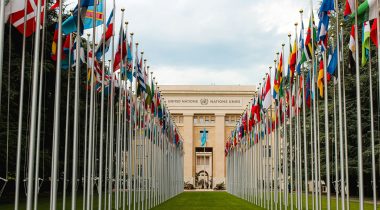
Luke Holland ■ UN calls on Netherlands to account for tax policy impact on child rights

Progress can seem slow where the battle for rights and accountability is concerned. But, for some years now, tax justice advocates have been pushing to advance formal legal recognition that abusive tax practices harm citizens and entrench inequalities by holding governments to account before international human rights bodies. This week marks one of those accountability moments.
The United Nations has issued a reminder that states, as duty bearers, have a responsibility to advance children’s rights. Activities such as profit shifting, offshoring wealth and hiding assets undermine public services. In so doing, these activities impede children’s access to good health care, clean water and sanitation, education for all and decent homes. Moreover, governments that enact policies that facilitate international tax abuse represent a danger to children’s rights in other countries.
The UN Committee on the Rights of the Child has published its Concluding Observations on two periodic reports of the Netherlands. The Committee recommended in their report that the country:
“… incorporate a child rights-based approach into the State budgeting process and conduct independent and participatory impact assessments of its tax and financial policies to ensure that they do not contribute to tax abuse by national companies operating outside the State party that lead to a negative impact on the availability of resources for the realisation of children’s rights in the countries in which they are operating”. (9c Allocation of Resources, CRC/C/NLD/CO/5-6).
Tax abuse has damaging impacts overseas
The scale of tax abuse across the globe is eyewatering. For example, the ‘contribution’ the Netherlands makes to the global tally of lost revenue amounts to $28 billion each year. Netherlands is one of the four ‘Axis of Avoidance’ jurisdictions – the others are Luxembourg, Switzerland, and the UK and its Overseas Territories and Crown Dependencies – which are collectively responsible for over half of global abuse annually. Not only that, in 2021, we reported that OECD countries and their dependencies are responsible for 92 per cent of the $170.7 billion the world loses to offshore wealth tax evasion every year; in other words, over $157 billion a year.
The impact of tax abuse on human rights is analysed in our report ‘Tax Justice & Human Rights: The 4 Rs and the realisation of rights’ using models developed by the Government Revenue and Development (GRADE) project at St Andrew’s University.
The GRADE data showed that if there was an increase in government revenue equivalent to the amount of revenue lost to global tax abuse, for countries where there is data available, the additional number of people accessing their fundamental human rights, including child rights, every year would be as follows:
- Sanitation – 34 million people
- Drinking water – 17 million people
Projecting over ten years (as tax abuse often takes place over decades):
- Reduction in infant and maternal mortality – 600,000 children and 73,000 mothers.
These figures show that the links of causality between cross-border tax abuses and rights violations are tangible and devastating. If children do not have access to their fundamental rights, many do not survive. Moreover, they are disproportionately impacted by these systemic injustices.
The Committee on the Rights of the Child’s decision to hold the Netherlands to account builds on a growing body of jurisprudence highlighting the role abusive tax practices – and the government policies that facilitate them – play in causing human rights deprivations. In 2020, following a submission by the Tax Justice Network and a coalition of allies, the same body called on another notorious tax haven – Ireland – to account for its role in enabling such practices.
Other UN human rights oversight bodies, including the Committee on the Elimination of Discrimination Against Women and the Committee on Economic Social and Cultural Rights, have previously demanded that countries like the United Kingdom and Switzerland do the same.
In a world where many of the most powerful governments are resistant to addressing tax abuse as a human rights issue, the United Nations treaty bodies provide a critical legal mechanism through which we can hold states to account. More than ever, we need these avenues to advance jurisprudence, deliver accountability, and raise greater awareness of why progressive, impact-assessed tax regimes and financial transparency are necessary to advance child rights.
The Concluding Observations issued by the Committee on the Rights of the Child to the Netherlands represent a small but highly significant step in advancing these concerns.
“Tax avoidance is, at heart, a children’s rights issue,” explained Alexandra Dufresne, Director of the International NGO Law and Policy Project at ZHAW School of Management and Law, who led in producing the submission. “States with weak tax and financial transparency laws profit from facilitating the hiding of money that could otherwise have been spent on schools, health clinics, roads, law enforcement, housing, electricity, high-speed internet and community development. In other words, they externalize the costs of their decisions on to other people’s children – often children an ocean away whom citizens in these states can neither see nor hear.”
Related articles
The elephant in the room of business & human rights
UN submission: Tax justice and the financing of children’s right to education
14 July 2025

How the UN Model Tax Treaty shapes the UN Tax Convention behind the scenes
The 2025 update of the UN Model Tax Convention
9 July 2025
One-page policy briefs: ABC policy reforms and human rights in the UN tax convention
Tax justice pays dividends – fair corporate taxation grows jobs, shrinks inequality

Reclaiming tax sovereignty to transform global climate finance

Uncovering hidden power in the UK’s PSC Register

Lessons from Australia: Let the sunshine in!


